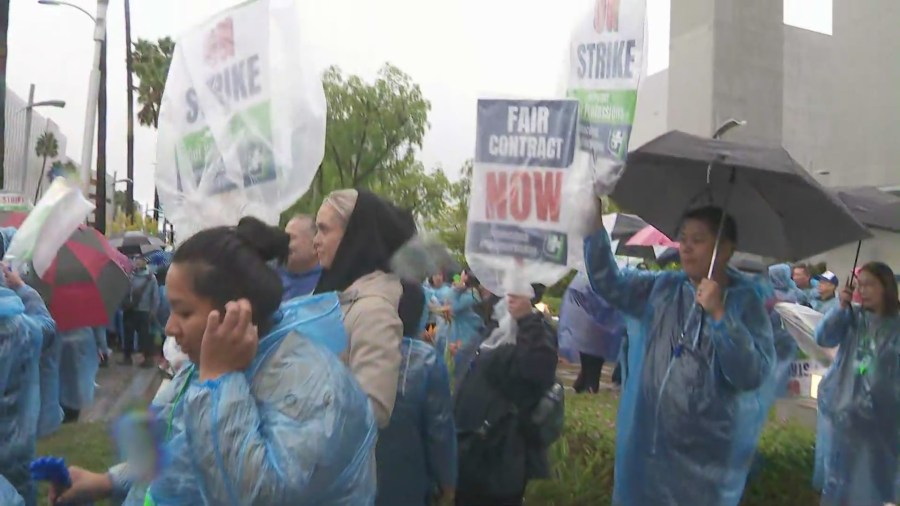Top Stories
Kaiser Healthcare Workers’ Strike Ends, Union Claims ‘New Momentum’

UPDATE: The five-day strike involving over 30,000 Kaiser Permanente healthcare workers has officially ended, marking a significant turning point in ongoing negotiations, according to union officials. The strike began on October 14, 2025, with workers across more than 500 facilities on the West Coast taking to the picket lines in response to claims of “unsafe staffing, stagnant wages, and deteriorating patient care conditions.”
More than 46,000 union members participated in the strike, with the majority concentrated in California, alongside workers in Hawaii and Oregon. The protest included registered nurses, pharmacists, nurse anesthetists, and various other healthcare professionals. Despite Kaiser Permanente’s declaration that the strike was “unnecessary and disruptive,” workers rejected their contract offer, leading to a historic walkout.
As the striking workers return to their posts, the United Nurses Associations of California/Union of Health Care Professionals (UNAC/UHCP) states that there is now “new momentum” in negotiations. The union pointed to the Joint Commission’s recently issued standards on medical facility staffing as a pivotal element in their renewed bargaining power.
“Unsafe staffing is unsafe care,” said Charmaine S. Morales, president of UNAC/UHCP and a registered nurse. She emphasized that these new standards will reshape contract negotiations, making staffing a national patient safety mandate. “Employers like Kaiser can no longer treat staffing like a budget line. We will ensure it’s enforced,” Morales added.
Union representatives are set to meet with Kaiser officials on October 22-23 to discuss economic issues, with wages being the central focus. Kaiser Permanente has proposed a 21.5% wage increase spread over four years, alongside enhancements to medical plans and retiree benefits.
In a statement, Kaiser Permanente expressed gratitude for the thousands of workers who stepped in during the strike and reiterated its commitment to high-quality care. “It’s critical that we keep quality, accessible healthcare coverage affordable while attracting and retaining top talent,” the company said, urging that “this offer does all this.”
As healthcare professionals return to work, the union promises to keep the pressure on management for a fair contract that prioritizes patient care. “This strike may be over, but the fight for patient safety is not,” the union concluded, signaling that the movement for safer staffing and fair wages is just beginning.
The urgency and scale of this strike signal a critical moment in healthcare labor relations, with ramifications not just for Kaiser workers, but potentially for healthcare systems nationwide. Stay tuned for further updates as negotiations resume later this month.
-

 Science1 week ago
Science1 week agoResearchers Challenge 200-Year-Old Physics Principle with Atomic Engines
-

 Politics1 week ago
Politics1 week agoNHP Foundation Secures Land for 158 Affordable Apartments in Denver
-

 Health1 week ago
Health1 week agoNeuroscientist Advocates for Flag Football Until Age 14
-

 Lifestyle1 week ago
Lifestyle1 week agoLongtime Friends Face Heartbreak After Loss and Isolation
-

 Health1 week ago
Health1 week agoFDA Launches Fast-Track Review for Nine Innovative Therapies
-

 World1 week ago
World1 week agoTroops to Enjoy Buffalo Chicken, Thai Curry in 2026 MREs
-

 Business1 week ago
Business1 week agoMaine Housing Inventory Surges to Post-Pandemic High
-

 Top Stories1 week ago
Top Stories1 week agoUnforgettable Moments: The Best Victoria’s Secret Performances
-

 Politics1 week ago
Politics1 week agoIsraeli Air Strikes in Lebanon Kill One, Wound Seven Amid Tensions
-

 Politics1 week ago
Politics1 week agoMassachusetts Lawmakers Resist Audit After Voter Mandate
-

 World1 week ago
World1 week agoGlobal Military Spending: Air Forces Ranked by Budget and Capability
-

 Business1 week ago
Business1 week agoSpirit Airlines Cuts Workforce with Furloughs for 365 Pilots









